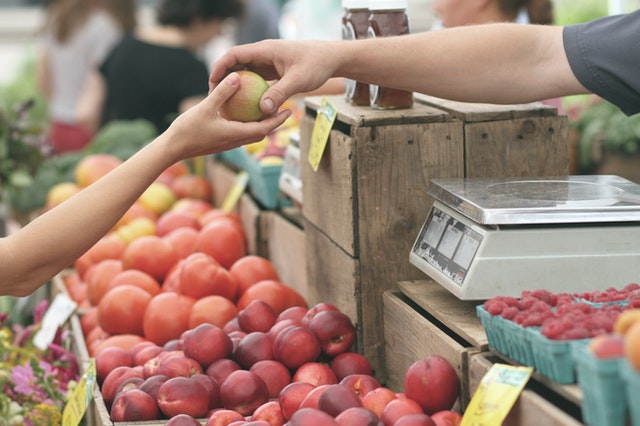The First of a Three-Part Series
By Abigail Mathew, Intern at the Alliance for Sustainability

It is vital that as individuals we make choices in our daily lives that help bring about sustainability. As consumers, we have the power to transform our world. Every dollar that we spend and every intentional action that we take is a vote for the kind of world we want.
At the Alliance for Sustainability, we define sustainability as being ecologically sound, economically viable, socially just, and humane, embodying our highest values in terms of how we treat people, animals, and the planet. Lucky for you, this is a great place to start because here are 8 tips to help you buy your groceries with sustainability in mind.
Plan Before You Buy
First and perhaps most important, ask yourself if you need something. Check to see if you might already have it. Then think about your coming week and ask how much of it you might need and whether you have space for it. Simply planning ahead can save you a lot of money, reduce food waste, and decrease greenhouse gas (GHG) emissions. Planning out your meals and snacks will allow you to buy only the perishable items that are throwing things out or having it go bad before you expect them to.

Buy Locally
A second tip is to buy local. When food is transported and exported from far away destinations, it is transported by boat, plane, or truck, which means even more GHG emissions. While ships are relatively efficient, planes are not and use a lot of fossil fuel while producing between 12 and 50 times more GHG pollution.
Not only does buying locally decrease food transportation, but it also supports regional growers and preserves prime agricultural land. It keeps money in the community and recirculates it.
A 2017 study from Central Oregon found “for every dollar spent on a local food product, $0.76 stays in the community. Comparatively, each dollar spent on food from outside the region resulted in only $0.28 remaining in the local economy. That means for every dollar you spend buying from your local farmer or rancher, an additional $0.48 is circulated through your local economy not only fueling jobs but also helping to make your community more resilient to external economic forces. Additionally, for every 5 new farm jobs created, an additional 2 off-farm jobs are created within the community.”
A farmers’ market is a great place to shop for affordable, local goods and produce while developing a relationship with the farmer and reducing packaging, which decreases your plastic consumption.
When shopping locally, try to find out about worker pay. At farmers’ markets, you are typically interacting with the growers themselves and can therefore compensate them justly. But when shopping at a grocery store you may not have a sense if workers and farmers are compensated fairly.
In addition to farmers’ markets, you can shop at a consumer co-op and even become a member. You can also consider getting a subscription to a community-supported agriculture (CSA) farm, in which you get a weekly box of produce for a yearly price that allows the farmer to plan and have an assured income.
If you don’t have access to these alternatives and shop at a local grocery store, you can still look for Fair Trade certified products, assuring that the growers receive fair pay and have proper working conditions. And of course, just making an effort to buy healthier, minimally processed and packaged food contributes to the fight against climate change, resource depletion, and plastic pollution.
Use Reusable Shopping Bags
Bringing your own reusable shopping bags is a simple way to avoid single-use plastic or paper shopping bags. Individuals in the U.S. use 100 billion plastic bags every year and only 1% of plastic bags are recycled, meaning the average family each year only recycles around 15 bags and the rest wind up as litter or in landfills. That is where reusable shopping bags come in handy because they are cost-effective, strong, and durable. Some stores even provide benefits if you use reusable bags, paying you a few cents for every bag that you bring.
I hope these are helpful first steps to shopping for sustainability!
Next: Opting for Seasonal, “Ugly” and Organic Produce

